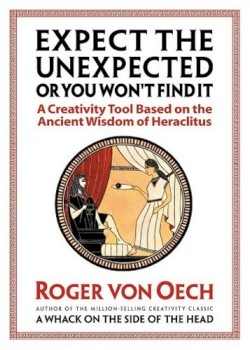Expect the Unexpected (or You Won't Find It)
A Creativity Tool Based on the Ancient Wisdom of Heraclitus
Even without a passion for ancient history or philosophy, most people are familiar with Aristotle, Confucius, and Plato, at least in passing. These philosophers’ ideas had a profound impact on civilization, based on the notion of reasoned inquiry. But many people today, when tackling writer’s block or dealing with a difficult co-worker, do not turn to the great thinkers for inspiration. That’s a problem, says the author, who believes that “creative thinking involves imagining familiar things in a new light, digging below the surface to find previously undetected patterns and finding connections among unrelated phenomena.” In this book, von Oech (an entrepreneur, consultant, and author), focuses on Heraclitus, successfully showing how teachings that were first espoused more than 2,500 years ago, by an ancient philosopher few have heard of, can be relevant in this brave new millennium.
Heraclitus believed that people tended to miss the miraculous because they got bogged down in the minutiae of everyday life. To think, this was well before television, the Internet, and cell phones combined to bombard every waking minute! To stir up lazy minds, Heraclitus composed pithy puzzles, designed to shake things up. Of these 125 epigrams, von Oech presents fifteen here, hoping, like his inspiration, to get readers’ creative juices flowing. The epigrams include such thought-provoking sayings as: “a wonderful harmony is created when we join together the seemingly unconnected”; “if all things turned to smoke, the nose would become the discerning organ”; “lovers of wisdom must open their minds to very many things”; and “the most beautiful order is a heap of sweepings piled up at random.” For each epigram, von Oech gives his interpretation, along with suggestions on how to apply it in today’s world. For example, all things turning to smoke represents a dramatic change of conditions, so he suggests altering one’s strategy. Asking “what if?” and switching the senses, he explains, are good ways to re-examine a conundrum.
Many illustrative examples are included throughout the book, as are short “mind-teaser” puzzles (answers given in the final thoughts), all designed to help wake up any mind that has drifted too long on autopilot. This book can be read in one or two entertaining sittings, or can be used as a reference, pulling out a particular epigram that seems timely. Accessible and enjoyable, Heraclitus’s thoughts, as presented by von Oech, are as fresh and useful today as they were around 500 B.C.E.
Reviewed by
Vicki Gervickas
Disclosure: This article is not an endorsement, but a review. The publisher of this book provided free copies of the book to have their book reviewed by a professional reviewer. No fee was paid by the publisher for this review. Foreword Reviews only recommends books that we love. Foreword Magazine, Inc. is disclosing this in accordance with the Federal Trade Commission’s 16 CFR, Part 255.

